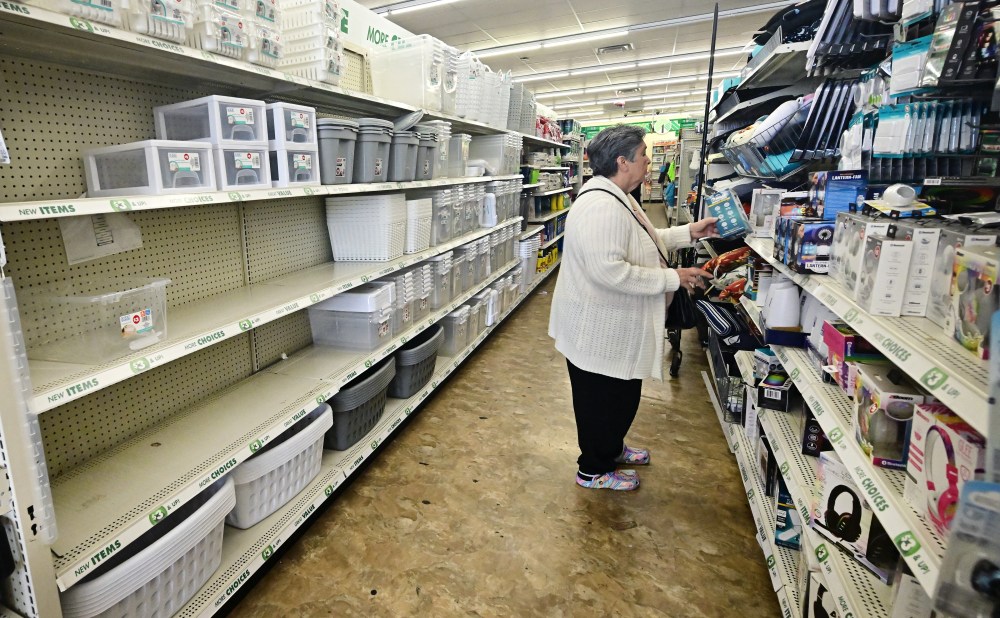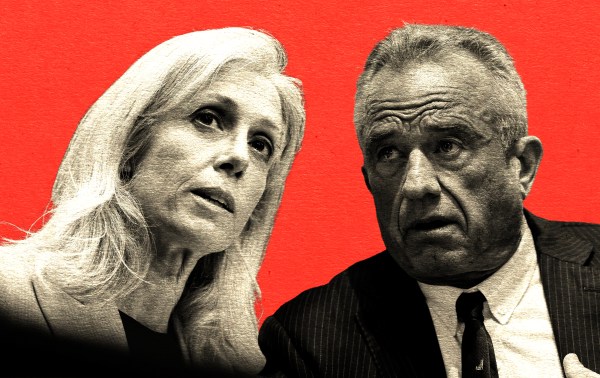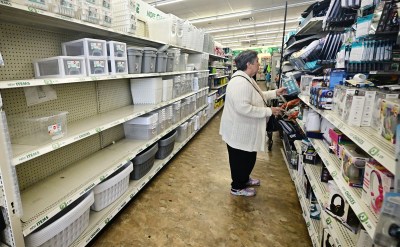Spier & Mackay is a clothing retailer based in Canada that famously provides some of the best value in menswear. I own two suits from them for which I paid $700 apiece.
One can get a mediocre suit for less from a hundred different shops, but a fully canvassed suit made with fabric from top-tier mills? Measured by bang for the buck, S&M is all but unbeatable.
You can guess how they manage to be such a bargain. Their products are manufactured overseas, including in China.
On Wednesday management emailed American customers to notify them that pricing had changed to reflect the new 145 percent tariff on Chinese-made products. Normally a $700 suit would be exempt, as it falls below the $800 threshold for a “de minimis” purchase, but the president eliminated that exemption for Chinese goods as of May 2.
My Twitter feed is ruthlessly curated to promote political news, not men’s apparel, so imagine my surprise when I logged in last night and the term “Spier & Mackay” started popping up. It felt like watching a movie and suddenly recognizing someone you know onscreen.
The fate of the business crossed over into the political space when critics of the president’s tariffs began retweeting angry S&M patrons venting their wrath at the absurdity of the new price increases. One made a purchase for $523 only to be hit with an $890 tariff on checkout. Total cost: $1,413. Another bought a $91 shirt and got stuck with a bill for $276 while a third ordered a sportcoat for $628 and came away owing just shy of $1,800.
Literally overnight, Spier & Mackay is no longer the best value in menswear. Whether a company beloved by its customer base will survive now depends on how long the tariffs on China persist (i.e., what mood Donald Trump happens to be in on any given day) and whether it can shift manufacturing to some lower-tariffed country before it goes belly up. Even if it manages to stay afloat, it’ll presumably need to make sacrifices on quality or price. Or both.
But who cares? Suits are still available in those hundred other shops I mentioned, right?
Spier & Mackay fans now have a few options. They can buy a quality American-made suit—if they can afford it, as those will cost much more than the comparable pre-tariff S&M merchandise did. They can buy a less expensive, cheaply made American suit that looks bad and wears out quickly, and which they don’t actually want to wear. Or they can buy a suit made overseas somewhere other than China, which may or may not be well constructed but which will also certainly cost more than it used to due to the 10 percent global tariffs imposed during the “pause” in the president’s trade war.
In other words, the various less satisfying options that led customers to seek out Spier & Mackay in the first place are now all they have left. Fewer choices, higher prices, lower quality: That’s the magic of Trump juche.
Yesterday the president told Americans to get used to it.
Abundance and scarcity.
Jonah Goldberg recently described the president as an “Abundance Democrat,” playing off the thesis of the new book by Ezra Klein and Derek Thompson. The left’s smartest wonks have discovered (very belatedly) that their side’s obsession with regulation has impeded growth of all kinds and are urging their comrades to reform.
Trump shares their belief, Jonah noted. For reasons good and bad, the president dislikes regulation and is keen to rid himself and the country (but mostly himself) of it. “Abundance” has always been a core Trump message, in fact. Elect me, he’s repeatedly told Americans, and we’ll have the biggest economy, the highest wages, the cheapest energy, and the most robust manufacturing base.
His arm-twisting of Ukraine and bullying of Denmark and Greenland can be viewed through that lens as well. He wants land, minerals, natural resources. He wants to make us and them (but mostly us) rich, rich, rich. Abundance! The man himself personifies the concept: His extreme wealth and taste for gaudy luxury fed Americans’ belief that he was born with a Midas touch that would benefit the country if he were elected president.
And it did, sort of. Fond memories of the booming, pre-COVID, pre-inflation economy of 2019 are what got Trump reelected last fall. Voters let their worries about his coup plot, his criminal indictments, and his obsession with “retribution” melt away as he whispered sweet nothings about abundance in their ears on the campaign trail.
Then, on Wednesday, he announced that abundance is overrated.
Asked by reporters what he thinks about newly expensive Chinese goods disappearing en masse from American stores, the president was sanguine. “You know, somebody said, ‘Oh, the shelves are going to be open,’” he replied. “Well, maybe the children will have two dolls instead of 30 dolls, you know? And maybe the two dolls will cost a couple of bucks more than they would normally.”
Even right-wing media was agog at his answer. Learn to be happy with less? That has to be one of the most un-American ideas a president has ever had.
Not “un-American” in the traditional sense, as in “inconsistent with the country’s civic values.” Trump says stuff in that vein every day, 20 times a day. I mean “un-American” culturally. The United States is supposed to be a land of plenty, the place where practically every foreigner aspires to live precisely because it offers the opportunity to make enough money to buy your daughter 30 dolls instead of two. The American dream is a dream of excess, not just owning a house but a big house—or two houses, even. Multiple cars, lavish vacations, a 65-inch TV in every room, all the electronic doodads your heart desires: abundance.
This is a country where, if you ask someone why they own 20 guns instead of one, they’re apt to snarl, “Because I g-ddamned well want to, that’s why.” Excess is as American as mom and apple pie.
More so than any president in my lifetime, Trump is supposed to embody an abundance mindset. Yet there he was on Wednesday not only encouraging a scarcity mindset among Americans but doing so in the most unappealing way possible. It’s not just adults who need to learn to live with less, he suggested, it’s their children. And it’s not just bare shelves that we all need to get used to, it’s the idea of paying more for goods that remain available.
“Asking American children to make do with fewer dolls and their parents to pay more for the privilege, all in the name of the greater good—you’ll own less and you’ll be happy—is a collectivist soundbite that could have come straight out of Bernie Sanders’ mouth. Except that Bernie would have framed it more tactfully.”
Didn’t this guy get elected promising to end inflation?
One Dispatch colleague noted that it’s not the prospect of a child having 29 dolls to play with instead of 30 that’s galling, any more than it’s the prospect of paying a few hundred dollars more for an American-made suit that’s troubling in the Spier & Mackay saga. It’s the fact that fewer, more expensive dolls and fewer, more expensive clothing options means downscale families will struggle to afford anything, in some cases perhaps forced to do without altogether. In a country governed by a scarcity mindset, it’s the working class—the people whom Trump and his movement supposedly care about—that takes it on the chin.
Choice and the greater good.
There’s something familiar about all this, no?
In 2016 the, ahem, globalists of the World Economic Forum excitedly predicted that in the future “you’ll own nothing and be happy,” an idea that incensed the American right. That’s the left’s whole putrid worldview in a nutshell, conservatives complained, forever rationalizing deprivation as something to aspire to for the greater good instead of an evil to be despised and avoided. Collectivists (especially environmentalists) view prosperity as a vice and hardship as a virtue. Individualists do the opposite.
A year earlier the most influential progressive in the United States framed the same ideological dispute in terms of consumer choice. “You can't just continue growth for the sake of growth in a world in which we are struggling with climate change and all kinds of environmental problems,” Sen. Bernie Sanders told CNBC. “You don't necessarily need a choice of 23 underarm spray deodorants or of 18 different pairs of sneakers when children are hungry in this country.”
It’s true, no one needs a choice of 23 deodorants. But an economy capable of offering a choice of 23 deodorants is an economy that’s likely to be growing over time, and growth is good for everyone. In Sanders’ view, the greater good requires the state to intervene and restrict consumers’ choices even if that means a smaller GDP. In the conservative view, the choice isn’t zero-sum: Prioritizing growth, abundance, and consumer choice will create national prosperity, and that prosperity will do more to improve the fortunes of the working class than Bernie’s redistributive scarcity approach will.
Between the result of November’s election and the success of Klein’s and Thompson’s book, it seemed like the right had won that argument. Or at least it did until our new right-wing president started, uh … restricting consumers’ choices for the sake of some greater good, one that exists mostly in his and Peter Navarro’s imaginations.
The idea of Trumpism having more in common with progressivism than with conservatism isn’t new to this newsletter (I touched on it as recently as Tuesday) but the president’s trade war has opened up an exciting new frontier in horseshoe politics in which right-wing central economic planning seems just as likely to wreck American abundance as left-wing central economic planning would. Under Trump’s leadership, the economy contracted in the first quarter of this year, ending a string of 11 straight quarters of growth. The stock market had its worst “first 100 days” performance under a new administration since 1974. Shortages of consumer goods are about to hit American retail as shipments from China evaporate. Corporations are slashing their earnings forecasts or suspending them altogether due to tariff “uncertainty.” Manufacturing, allegedly the prime beneficiary of America’s new trade policy, is in chaos.
Asking American children to make do with fewer dolls and their parents to pay more for the privilege, all in the name of the greater good—you’ll own less and you’ll be happy—is a collectivist soundbite that could have come straight out of Bernie Sanders’ mouth. Except that Bernie would have framed it more tactfully.
A progressive movement.
Not coincidentally, right-wing populists have also begun emulating the left by scapegoating corporations for the damage caused by their own policies.
The White House itself did so a few days ago when rumors circulated that Amazon was about to start featuring the cost of tariffs next to the price of items, a move Trump spokesman Karoline Leavitt called “a hostile and political act.” Trump promptly dialed up Jeff Bezos to complain, and the plan (if it ever existed) was scrapped. The president was “pissed,” one White House official told CNN. “Why should a multi-billion-dollar company pass off costs to consumers?”
Why shouldn’t private enterprise happily absorb an immense financial burden placed upon it by the state, the supposedly Republican adviser wondered?
Demanding that a corporation, even a big one like Amazon, simply swallow the cost of a steep new tax—one known to change moment to moment based on the president’s whims—is so financially lamebrained that I wonder if even Sanders would stoop to it. But progressive dogma that corporate greed, not terrible policy, is primarily to blame for higher prices has already begun to seep into MAGA demagoguery. As the Amazon rumors swirled this week, Fox Business host Charles Payne went as far as to wonder why the company’s profit margins need to keep increasing(!) and accused it of playing a “dangerous political game” for supposedly wanting to highlight how tariffs had caused prices to rise.
Aren’t … aren’t higher prices the point of tariffs, though?
Having to pay $1,800 for a $600 Chinese-made sportcoat at Spier & Mackay isn’t a weird unintended side effect of Trump’s trade policy. It’s the goal. By making Chinese goods prohibitively expensive, the White House is deliberately reducing the choices available to American consumers in hopes of forcing them to buy American (or at least non-Chinese) alternatives instead. Why would the president and the morons around him object to Amazon informing its customers of the new economic reality that the administration has spent weeks painstakingly creating?
And why would anyone in the West Wing want Amazon to swallow the cost of the tariffs? That won’t do anything to crush demand for Chinese imports; all it’ll do is make the company’s shareholders poorer and potentially put Amazon out of business. One of the great mysteries of the trade war, in fact, is who Trump and his team believe is—or should be—feeling most of the financial pain from his policy. His comment about dolls suggests that he understands consumers will do so; his deputy’s comment to CNN implies that they expect corporate America to bear the burden; but in an interview with ABC News on Tuesday, the president predicted that China itself would “eat” the tariffs imposed on it.
China will not be graciously picking up the tab on Americans’ behalf for a 145 percent levy, as those who read John McCormack’s report on the site today already know. But that sort of fantasy is common to progressive economic thinking: Is it so different from the left believing it can fund its entire policy wishlist by hiking taxes on the rich? In both cases, it’s less a matter of crafting sober, realistic policy (which Trump is plainly incapable of doing) than of identifying a political scapegoat and insisting that one’s problems can and will be solved if only that scapegoat suffers enough.
The irony of all this is that traditional conservatives have been waiting a long time for the right to adopt more of a scarcity mindset on fiscal policy.
Not by limiting consumer choice, of course, but by confronting the hard budgetary math on America’s distended national debt. Learning to be happy with less is unfortunately an unavoidable long-term consequence of our entitlement crisis—yet Trumpified Republicans in Congress, by dispensing with all pretense of fiscal discipline, are poised to outdo even progressives by passing a new spending bill that might plausibly detonate “the debt bomb” that the country has been sitting on for the last 30 years. Imagine that. The long-awaited reckoning with unsustainable spending might arrive not because of a government controlled by President Bernie Sanders’ party but because of one controlled by President Donald Trump’s.
America desperately needed a right that understood that the country’s abundance owes too much to borrowing from others. What it got instead was a right that’s generating scarcity artificially and needlessly because it can’t stop romanticizing the idea of generations within the same family getting stuck working the same thankless, backbreaking factory jobs as their ancestors. When the New York Times interviewed a retired textile worker in South Carolina recently about bringing that industry back to his town, he reminisced about the crappy pay, dangerous conditions, and nonexistent upward mobility and wondered, “Why would the younger generation want to work there?”
It would be nice if the closest we got to a left-wing mindset in Trump’s presidency was the North-Korea-like spectacle that presidential Cabinet meetings have become but we’re not going to get off that easy. Nor do we deserve to.







Please note that we at The Dispatch hold ourselves, our work, and our commenters to a higher standard than other places on the internet. We welcome comments that foster genuine debate or discussion—including comments critical of us or our work—but responses that include ad hominem attacks on fellow Dispatch members or are intended to stoke fear and anger may be moderated.
With your membership, you only have the ability to comment on The Morning Dispatch articles. Consider upgrading to join the conversation everywhere.